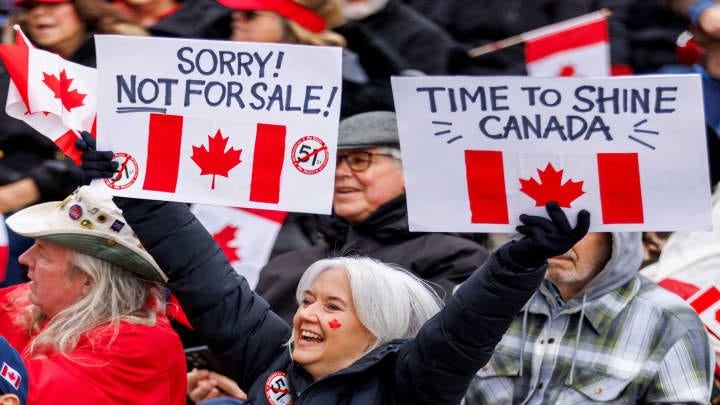Canadians are skipping trips to the U.S. and visitors from other countries could soon follow threatening to deepen the United States' $50 billion travel deficit.
How did we end up pissing off CANADA 🇨🇦 🥴
Trips from Canada to the U.S. are dropping, threatening to widen the United States' $50 billion travel and tourism deficit.
Canada is the top source of international visitors to the United States.
The White House said Friday that Canadians "will no longer have to endure the inconveniences of international travel when Canada becomes our 51st state."
Several other countries have issued travel warnings for travelers considering going to the U.S.
Experts say they're pulling back for a variety of reasons, ranging from an unfavorable currencyexchange rate to the U.S. political climate given President Donald Trump's trade policies and his public statements on annexing Canada, as well as high-profile detainments of people who already had visas to be in the U.S., long wait visa times and other policies that have added to tensions with longtime close allies.
Reached for comment Friday, a White House spokesperson said by email that "everybody wants to come to President Trump's America."
Canadians "will no longer have to endure the inconveniences of international travel when Canada becomes our 51st state" and that "Europeans are eager to enjoy the Golden Age of America if they so choose to," the spokesperson said.
In response to President Trump's tariff plans at the time, former Canadian Prime Minister Justin Trudeau last month urged Canadians to "choose Canada" and suggested "changing your summer vacation plans to stay here in Canada and explore the many national and provincial parks, historical sites and tourist destinations our great country has to offer."
The cross-border travel trends and Trump administration's policies are worrying some in the United States' travel industry, which draws in more than $1 trillion in direct spending a year.
The U.S. Travel Association said in a statement to CNBC that there is a "a question of America's welcomeness, a slowing U.S. economy and recent safety concerns.
"These challenges are real and demand decisive action," the organization, whose members include large hotel groups, airlines and other major travel companies, said, adding that is "actively working with the White House and Congress to advance policies that drive economic expansion and keep the U.S. competitive on the global stage."
There are billions of dollars on the line. People from the United States already travel abroad and spend more in other countries than the U.S. brings in from foreign travelers.
Last year, the United States' travel deficit was more than $51 billion, meaning Americans spent that much more abroad than foreigners visiting the U.S. spent, stripping out spending for medical and educational purposes, which still showed a deficit, according to Commerce Department data.
The U.S. brought in more than 72 million visitors last year, still below pre-Covid levels, according to a report from Jefferies. Visitors from Canada were the largest group, accounting for 28%, followed by Mexico at 23%, the bank said in a note this month.
Travel and tourism of inbound visitors are counted as U.S. exports, and they accounted for about 8% of U.S. exports of goods and services, according to the Commerce Department.
International visitors from overseas are especially important because they tend to stay longer and spend more money than local tourists, according to the U.S. Travel Association.
Some Canadians travel elsewhere
Both air travel and land crossings between the United States and Canada are down.
In February, Canadians' return flights to Canada fell 13% over last year while return trips by car dropped 23% according to Statistics Canada.
Hotel demand in some area along the Canada-U.S. border are also down. As of March 15, they were off 8% in Bellingham, Washington, and 3.5% in the Niagara Falls area, according to hotel data firm STR. However, demand throughout Florida, a top destination for Canadian travelers, is up 3% over last year, the firm said.
Canadian airlines are cutting some routes and flights to the U.S.
Canadian airline Flair, for example, said it canceled its planned Toronto to Nashville, Tennessee, route.
"Our network decisions are driven solely by consumer demand—we deploy our aircraft where demand is strongest to provide the lowest fares to the most travellers," a spokeswoman for the airline said by email.
Canadian airline WestJet said it has seen Canadian customers shift bookings from the U.S. to other popular sunseeker destinations like Mexico and the Caribbean.
"The airline remains focused on knowing where people want to go, and we will continue to fly where there is demand," a spokeswoman said.
The shift comes as travel executives have warned about weaker-than-expected bookings for domestic U.S. trips, meaning more local tourism might not be able to make up for the drop in trans-border travel. While U.S. household credit and debit card spending overall was up 1.5% over last year as of March 22, spending on airlines dropped 7.2%, according to a Bank of America report this week.
United Airlines CEO Scott Kirby, for example, said at an investor conference earlier this month that the carrier is trimming routes in part because it's seeing "a lot of it trans-border, big drop in Canadian traffic to go into the U.S.," as well as a sharp drop in flights that had previously catered to U.S. government-tied travel.
Lara Harbachian, who works for a digital printing company in Montreal, and eight friends (so far) had been considering several U.S. destinations this year to celebrate their 40th birthdays: San Diego; Palm Springs, Calif.; Savannah, Georgia; or Nashville. The winner was farther east: Barcelona, Spain.
While the flights to Europe were more expensive than the ones to the U.S. destinations, Harbachian said it will be cheaper for her and her friends to visit the popular Spanish city, where they won't need to rent a car and high-end meals and hotels are cheaper, especially with a weaker Canadian dollar over the greenback.
"I can get a 15 euro meal but I can't get a $15 meal" in the U.S., she said.
Trump earlier this month created a task force for the 2026 FIFA World Cup that the U.S. is co-hosting with Mexico and Canada to "showcase the Nation's pride and hospitality while promoting economic growth and tourism through sport."
Travel warnings about the U.S. grow
Another challenge for the U.S. travel industry this year is a growing number of travel warnings about the visiting the United States. So far, Germany, the United Kingdom, France, Denmark and Finland have issued travel warnings for their citizens who are planning to go to the United States.
Those were prompted by detentions even of individuals who had visas to be in the United States as well as Trump's executive order that the country would only recognize two biological sexes, prompting concerns from governments in Europe about travelers whose passports state a different gender than the one they were born with.
For example, Germany said that "travelers with the gender entry "X" or whose current gender entry differs from their birth date should contact the responsible U.S. diplomatic mission in Germany before entering the country to find out about the applicable entry requirements."
Travel warnings "could deter international visitors, especially first-time travelers," said Carolin Lusby, assistant professor in tourism at the Chaplin School of Hospitality & Tourism Management at Florida International University.
She said there is often a rebound after an incident or tragedy occurs, such as after the Paris terror attacks in 2015. "But a lot of times is we know that once a destination image changes, it takes a lot of effort to bring back the trust," she said.
"In terms of the economic consequences, that could turn into billions of lost dollars," she added.
How Canadians react?
https://policyoptions.irpp.org/magazines/march-2025/canada-dangerous-world/
These Countries Have Issued Travel Advisories for the United States
With an increasing number of foreign visitors facing challenges at the border, countries including Canada and Germany have updated their travel advisories for the US.
Canadian citizen Jasmine Mooney had been traveling between her home country and the US on a work visa for years without issue—but a few weeks ago, she was detained by US border authorities after attempting to renew her documentation at the US-Mexico border. During a 12-day ordeal, she says she was held in cold and crowded jail cells and even put in chains at points.
Mooney is just one of several people who have attempted to travel to the US recently who have faced challenges at the border, including a researcher who French officials say was denied entry after his phone was searched and immigration officers found messages that were critical of the Trump administration.
Following these incidents, Canada and several European countries have issued travel advisories for the US. While most of the government warnings don’t specify why they were added, the timing points to the the Trump administration's executive orders regarding immigration and the tightening of border policies.
“The whole purpose is to stop illegal immigration,” Larry Yu, professor of hospitality management at The George Washington University's School of Business tells Condé NastTraveler. “But then the executive orders are also tied to other issues like transgender identification, so it actually adds quite a bit of confusion, uncertainty, and concern for the US travel industry.”
https://www.newsweek.com/map-us-travel-warnings-europe-travel-advisories-2051360
Many of the European countries that have issued US travel warnings have flagged the White House’s executive order that states “it is the policy of the United States to recognize two sexes, male and female,” potentially causing issues for transgender travelers with self-identified or “X” gender markers on their passports.
The recent uptick in travel warnings could have a major impact on US tourism, according to Yu, as several of the advisories were issued by countries that are top drivers of inbound travel to the US, including Canada, the UK, and Germany.
“The image the US has always projected is that we’re welcoming and diverse," Yu says. “This will clearly make people think about how they see the US. I hope it won’t erode their confidence in traveling to the US, but it may affect certain demographics.”
International travel advisories for the US are not entirely new; however, most posted in recent years have been in regard to gun violence. Uruguay and Japan both issued alerts to its citizens in wake of the Dayton, Ohio, shooting in 2019. Japan’s Ministry of Foreign Affairs currently lists gun crime as a “major public safety concern in the US,” including safety advice and statistics on the most common locations and timings of shootings. Japan also warns about the high number of hate crimes in the US based on race, sexual orientation, and religion.
Australia-based small-group adventure travel company Intrepid Travel has already started to see “some softening in demand for the US, in particular from Europe,” according to its CEO James Thornton, who notes that US domestic travel (travel by Americans in America) is down by 27% and travel to the US from Europe, the Middle East, and Africa is down by 12.8% compared to last year.
“This could be due to a number of factors, including the strength of the US dollar, but we believe that the US administration’s polarizing approach is definitely having an impact," he says.
What are your travel plans this year?
I will stay in California, no travels for me until the situation on US airports has calmed down. Accordingly to witnesses , ICE behaves like the KGB or the SS in the 1930‘s Germany, so I decided I proceed with traveling ones these lunatics are gone, hopefully soon.
Greetings from sunny California , this was today in Manhattan Beach with my newly adopted baby puppy Stella, which is Italian for “ Star”🌟
REBEL, REVOLT, RESIST!
Love 💕 NIKA







Thank you for compiling the numbers. We plan to visit Canada to visit our Northern friends. Nowhere in the US. Musk chainsawing FAA will limit domestic travel.
Sadly, can’t blame them. We don’t even feel safe.